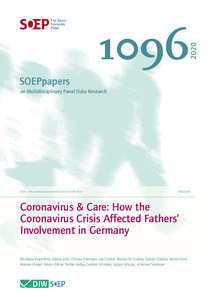Coronavirus & care: how the coronavirus crisis affected fathers' involvement in Germany

Kreyenfeld, Michaela ; Zinn, Sabine ; Entringer, Theresa ; Goebel, Jan ; Grabka, Markus ; Graeber, Daniel ; Kroh, Martin ; Kröger, Hannes ; Kühne, Simon ; Liebig, Stefan ; Schröder, Carsten ; Schupp, Jürgen ; Seebauer, Johannes
Deutsches Institut für Wirtschaftsforschung, Berlin
DIW - Berlin
2020
23 p.
epidemic disease ; child care ; family responsibilities
SOEPpapers on Multidisciplinary Panel Data Research
1096
Social protection - Family responsibilities
https://www.diw.de/documents/publikationen/73/diw_01.c.794183.de/diw_sp1096.pdf
English
Bibliogr.
"Background: As a response to the spread of the coronavirus in Germany, day care centres and schools closed nationwide, leaving families to grapple with additional child care tasks. In Germany, as in many other societies, women shoulder the lion's share of housework and child care responsibilities. While the gendered division of household labour has shifted in recent years as men have become more engaged in the upbringing of their children, it was hypothesised that the coronavirus crisis may have resulted in a re-traditionalisation of behaviour. This paper examines this hypothesis by analysing how the time fathers spent with their children changed over the course of the coronavirus crisis in the case of Germany. Methods: Data for this investigation come from the German Socio-Economic Panel (GSOEP). The outcome variable is the time spent on child care tasks. We investigate how the time parents spent with their children changed between 2019 and spring 2020, and how these patterns differed by gender, education, and employment situation. As a method, we employ linear panel regressions where the dependent variable is the change in childcare time between the two survey years.Results: We find that fathers and mothers expanded the time they spent on child care to similar degrees between 2019 and spring 2020, which marks the climax of the coronavirus crisis. However, we also observe large differences by level of education. In particular, we find that men with low and medium levels of education spent more time with their children than they did before the onset of the crisis. This finding is at odds with the results of prior studies on fathers' involvement, which showed that highly educated men tend to be the vanguards of paternal involvement. Contribution: Our study provides novel evidence on the effect of the coronavirus crisis on fathers' involvement in child care. Contrary to expectations based on previous research, we find that fathers significantly expanded the time they were spending with their children over the course of the crisis. While we also find that women continue to perform the bulk of child care tasks, our results cast a positive light on the potential of paternal involvement in contemporary societies."
Digital
The ETUI is co-funded by the European Union. Views and opinions expressed are however those of the author(s) only and do not necessarily reflect those of the European Union or the ETUI.